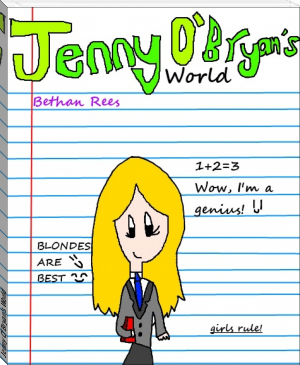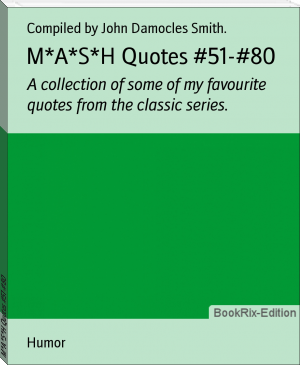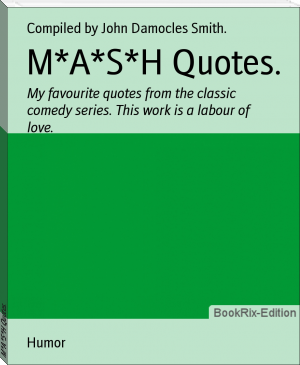The History and Records of the Elephant Club, Doesticks and Underhill [ereader with dictionary .TXT] 📗

- Author: Doesticks and Underhill
Book online «The History and Records of the Elephant Club, Doesticks and Underhill [ereader with dictionary .TXT] 📗». Author Doesticks and Underhill
"Hurrah for Boggs," shouted Dropper.
"Boggs, you're a philanthropist," said Spout.[Pg 32]
"Vive le Boggs," said Van Dam.
"Gentlemen," said Boggs, "I protest against your unwarranted compliments. My dear sir," said he, addressing the stranger, "you only borrowed a dollar of me, whereas, I perceive you have given me one dollar and twenty-one cents."
"Three years interest, at seven per cent," suggested the stranger, "Legally your due, and I insist upon your accepting interest as well as principal."
Boggs, without further objection pocketed the proffered amount.
"Your case," said Spout, to the stranger; "is one of morbid concientiousness; so much so that I feel desirous of knowing you better."
"My name, gentlemen," said the stranger, "is Dusenbury Quackenbush."
A general rush was made toward the stranger. Van Dam seized one hand, Boggs the other; Spout caught him by the arm, whilst Dropper, who was the last to reach him, threw his long arms around the whole party. For a moment there was general commotion, growing out of a fierce shaking of hands and arms. Each person loudly assured Mr. Quackenbush of the happiness he felt in having formed his acquaintance. As soon as they had relieved him[Pg 33] from their affectionate welcomings Mr. Quackenbush spoke.
"I am certainly happy to become acquainted with you, gentlemen," remarked he, "but really I am fearful I shall not be a very interesting acquaintance in a coterie of old friends, as you appear to be, and without doubt are."
"Yes, we are old friends," said Spout, "our friendship is as enduring as the gullibility of the public, and I might add as ancient as—as—gentlemen excuse me if I fail in this point to institute an appropriate comparison. As an astonisher, however, I will inform you of a fact known only to Mr. Van Dam and myself; and which is, that, two hours since, not one of the gentlemen of this quintet had ever known another of it; if I except the case of Mr. Boggs and Mr. Quackenbush."
"Mr. Quackenbush," inquired Spout, "allow me to ask whether you are acquainted with life in the metropolis in its multiform phases?"
"I confess my ignorance," was the reply. "It is most unfortunate that the position of a teacher in a public school is one not calculated to bring an individual in contact with much that is interesting."
"Taking that fact into consideration," said Spout, "I propose, that you all meet me at my room, two[Pg 34] evenings hence, when I shall be prepared to unfold to you a purpose and a plan, which I have just conceived. My room, gentlemen, is over old Shavem's, the brokers, three doors from the corner. The number would be 461½, if there were any on the door. You can't mistake the place, however; there is an antiquated pump in front, and when I'm at home there is a Spout inside."
"Oh—h!" groaned Dropper.
"Never mind," resumed Spout, "I don't often attempt such things. Can I depend upon your coming?"
All gave an affirmative response.
"Then," said Spout, "you can depend upon my going, I pronounce this meeting adjourned."
After a few words the parties separated.

 [Pg 35]
[Pg 35]
Put out the light, and then put.—Shakspeare.
THE evening arrived on which the gentlemen, named in the last chapter, were to meet in the room of Mr. John Spout.[Pg 36]
Mr. Spout was there, awaiting the arrival of his friends. He was seated  at the end of a table, in a large easy-chair, in his dressing-gown. Before him, on the table, were several written papers. The apartment was one of moderate dimensions, neatly carpeted, and, with plenty of furniture, unobjectionable in quality and taste. On the walls were suspended various pictures, engravings, fencing-foils, and masks, boxing-gloves, antique models, Indian ornaments, plaster casts of legs, arms, hands, feet, &c. On either side of the table were two chairs, placed there, evidently, in anticipation of the arrival of his friends.
at the end of a table, in a large easy-chair, in his dressing-gown. Before him, on the table, were several written papers. The apartment was one of moderate dimensions, neatly carpeted, and, with plenty of furniture, unobjectionable in quality and taste. On the walls were suspended various pictures, engravings, fencing-foils, and masks, boxing-gloves, antique models, Indian ornaments, plaster casts of legs, arms, hands, feet, &c. On either side of the table were two chairs, placed there, evidently, in anticipation of the arrival of his friends.
Several pipe-stems protruded from a pasteboard box, which was on the table. It required no unusual shrewdness to guess at the contents, and to rightly determine that it was filled with the best-abused, and, at the same time, best-used weed known.
One by one, the other gentlemen arrived, and were ushered by the housekeeper into Mr. Spout's apartment. They sat, engaged in discussing tobacco and the events of the day. At length, Mr. Dropper inquired of Mr. Spout if he had as yet fully elaborated the idea which, on the occasion of the previous meeting, had seemed to weigh so heavily on his mind?
"I was about to advert to the subject," said Mr.[Pg 37] Spout. "It has engaged my undivided attention up to the present time, and the idea and plan based upon it are sufficiently perfected to satisfy myself."
"Trot it out," said Boggs, "we are all attention."
"The fact, gentlemen," said Spout, "that most of our number have been either absent from the city, or so much engaged in our different vocations that we have never gained, or have lost, familiarity with many interesting phases of life, as it exists in New York, suggested to me the thought of devoting some portion of our time to looking about, and having put our observations in writing, to interchange them for our mutual gratification."
"A capital idea," said Mr. Dusenbury Quackenbush.
"Brilliant with pleasurable results," remarked Mr. Myndert Van Dam.
"Replete with rational enjoyment," suggested Mr. Remington Dropper.
"I'm in," was the laconic response of Mr. James George Boggs.
"Then I suppose I can count upon your coöperation in the realization of the idea," said Spout.
A general affirmative answer being given, Mr. Spout continued.
"You being unanimous," said he, "I'll now pro[Pg 38]ceed to unfold my plans. To secure unanimity of action and entire success, it is necessary that we have a plan of organization. But in thinking upon this subject, I have foreseen that, by the adoption of any of the ordinary plans, we saddle ourselves with a useless machinery, which will hinder the successful accomplishment of the object we desire. We have no time to spare in discussing rules of order, the adoption of which invariably makes disorder the rule. Yet, there must be a head. In brief, then, gentlemen, I propose that the principles upon which our meetings shall be governed, shall be a despotic principle, but one which shall be compatible with the largest liberty of the governed. How do you like the idea?"
"The idea looks paradoxical to me," said Van Dam.
"Rather profound," suggested Quackenbush.
"Funny," said Boggs.
"I can tell better when I hear the rules," said Dropper.
"I have them prepared," continued Spout. "Shall I read them to you?"
"By all means," replied Van Dam.
The others signified an affirmative response.
Mr. Spout then proceeded to read:[Pg 39]—
"We, whose signatures are hereunto affixed, do hereby organize ourselves into a club, having for its
NAME,
The Elephant Club, and having in view the following
OBJECTS:
1. The enjoyment and amusement of its members through.
2. A profound study of the Metropolitan Elephant, by surveying him in all his majesty of proportion, by tracing him to his secret haunts, and observing his habits, both in his wild and domestic state.
OFFICER.
The only officer of the club shall be a Higholdboy, whose
DUTY
It shall be to sit in a big chair, at the end of the table, and to see that the members conform to the following
RULES OF CONDUCT:
1. In the meetings of the club, every member shall do exactly as he pleases.[Pg 40]
2. Each member shall speak when he pleases, what he pleases, and as long as he pleases.
N.B.—If the remarks of any member are particularly stupid or tedious, the other members are under no obligations to remain and hear them.
N. particular B. Should the speaker, at the conclusion of his remarks, find himself in the presence of only a part of his original audience, and some of those asleep; he is at full liberty, for his private satisfaction, to conclude that his eloquence, like that of the traditional parsons, is not only moving and soothing, as evidenced by the absence of some and the somnolence of others, but so satisfactory that those who were awake will never care to hear him again.
3. No member shall be permitted to bring spirituous or fermented liquors, wine, beer, or cider, whether imported or domestic, into any of the meetings of the club, under the penalty of passing them around for general use; unless the member prefers to keep them to himself, from motives of economy—the economy in such case to be regarded as an offence, to be punished with a severe letting alone.
4. The third rule shall apply to cigars, cheroots, and cigaretts.[Pg 41]
5. Ditto—ditto—sardines, Bologna sausages, crackers and cheese.
6. Members are prohibited from sitting with their feet on the table, unless in that position they sit with more comfort, or they have other reasons satisfactory to themselves.
N.B.—The Higholdboy, in consideration of his onerous duties, is exempted from the action of this rule.
7. The Higholdboy is empowered to reprimand any member, when he considers it necessary to preserve the dignity of the club.
N. special and particular B. In order that this rule shall not operate prejudicially to the sovereign rights of individuals, the members of the club are at liberty to treat the reprimand of the Higholdboy as a good joke.
8. Any member who shall be absent from any meeting of the club, shall be liable to stand a half-dozen on the half shell for each of his fellow-members, unless he gives no previous notice to the club, or any member thereof, of his prospective absence. Such notice, which he fails to give, to be either verbal or written, at his own option.
9. These foregoing rules shall in all cases be construed strictly, they shall never be repealed or[Pg 42] amended; and shall be of binding force, except as hereinafter provided in the
ORDER OF BUSINESS.
1. The Higholdboy shall announce the suspension of all rules for three months.
At the conclusion, Mr. Spout, in a solemn tone, addressed the party.
"Gentleman," said he, "I am aware that the rules, which I have prepared and submitted, are stringent in the extreme, but I think they will be found, on examination, to be no more so than is essential to secure that unanimity of action so indispensable to the accomplishment of any great end. Believing, then, that you fully appreciate the importance of the end we have in view, I trust they will meet with your approval. Gentlemen, I give way to others."
Mr. Spout took his seat, amid manifestations of the approval of his associates.
Mr. Boggs was the





Comments (0)